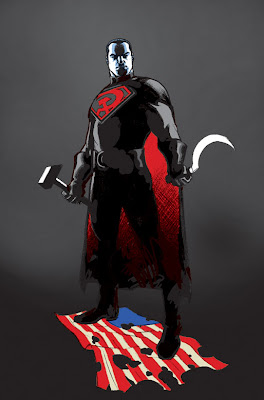Red Son takes place in an alternate reality where Superman's escape pod was launched a few hours later. It's small difference with major ramifications: he landed in Stalinist Ukraine, where he was raised to be a communist icon.
I love that. What a simple way to subvert a quintessentially American character!
And it's a pretty different world. Instead of being a ruthless capitalist, Lex Luthor is the world's smartest scientist. And he's married to Lois Lane. And Jimmy Olsen works for the CIA, instead of the Daily Planet.
Interesting! Why did Superman's Soviet upbringing cause Lex to pursue more academic endeavors? How could Lois fall in love with an emotionally negligent supervillain? What idiot allowed Jimmy Olsen in the CIA?
Unfortunately, writer Mark Millar doesn't explore the ripple effect of his premise. The characters' names are familiar, but the characters, themselves, aren't.
Luthor has been depicted as a machiavellian CEO for thirty years, but in Red Son, he's an evil Mr. Fantastic. This change in personality is never explained. Millar might as well have written him as a polar bear.
And with that, Red Son's great premise is squandered.
We like alternate realities because we like to speculate about whether or not we've made the right decisions. The whole point of writing an alternate reality is to compare it with the reality it's based upon.
If you're not gonna compare the realities, then it shouldn't be an alternate reality, to begin with. Take pride in the fact that you're telling an original story, and don't get distracted with cameos, allusions, and general fanservice.
I'm disappointed that I have to write this down. Like, it's a good theory, but it feels a little like saying, "If you're producing a movie, you should make sure there's stuff for the audience to look at on the screen."

No comments:
Post a Comment